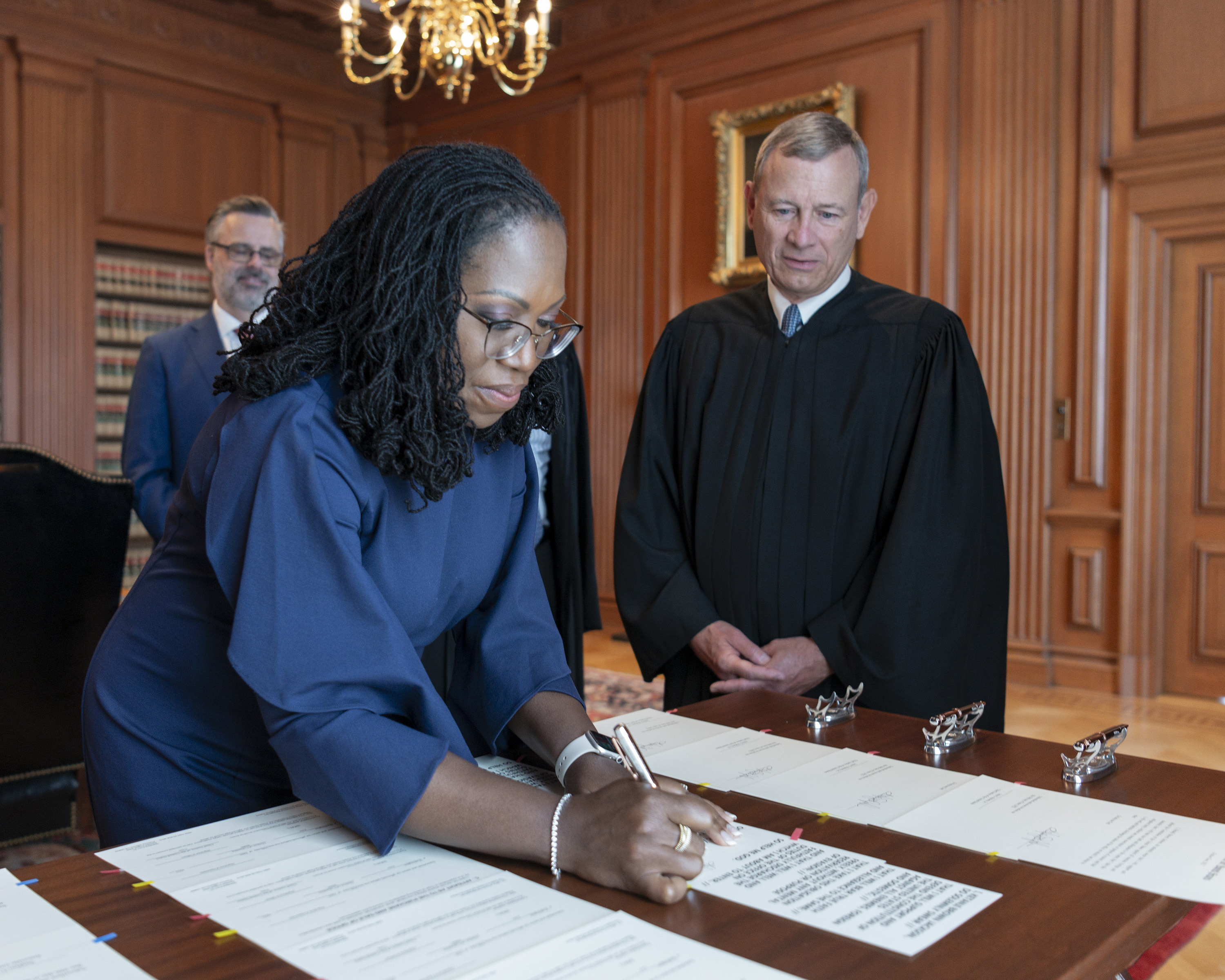
Justice Ketanji Brown Jackson was sworn in as the newest member of the Supreme Court on Thursday, becoming the first Black woman to serve on the nation’s highest court.
She replaces former Justice Stephen Breyer, who retired from the bench at noon ET.
Earlier in the day, the Supreme Court released decisions on two significant cases concerning the environment and immigration as it finished its term.
New justice
Jackson, 51, joins the court as its 116th member amid a time of heightened scrutiny of the court over recent decisions and the American public’s low confidence in the Supreme Court.
“With a full heart, I accept the solemn responsibility of supporting and defending the Constitution of the United States and administering justice without fear or favor, so help me God. I am truly grateful to be part of the promise of our great Nation,” Jackson said in a statement.
During her confirmation hearings earlier this year, she vowed to be fair and impartial as justice in deciding the law. “I am standing on the shoulders of my own role models,” she said during a White House event marking her historic confirmation.
Read more about her background here and watch the moment she was sworn in here.
EPA decision
The Supreme Court curbed the Environmental Protection Agency’s ability to broadly regulate carbon emissions from existing power plants. It’s a major blow to the Biden administration’s attempts to slash emissions at a moment when scientists are sounding alarms about the accelerating pace of global warming.
In addition, the court cut back agency authority in general invoking the so-called “major questions” doctrine – a ruling that will impact the federal government’s authority to regulate in other areas of climate policy, as well as regulation of the internet and worker safety.
Chief Justice John Roberts wrote the opinion for the conservative majority, with the three liberal justices dissenting. Roberts said that “our precedent counsels skepticism toward EPA’s claim” that the law “empowers it to devise carbon emissions caps based on a generation shifting approach.”
Justice Elena Kagan, writing for the dissenters, sounded the alarm about global warming and said that the court’s decision “strips” the EPA of the “power Congress gave it to respond to ‘the most pressing environmental challenge of our time.’”
“I cannot think of many things more frightening,” she said.
The White House, along with environmental experts, blasted the decision, while Republicans like West Virginia Gov. Jim Justice applauded it.
Immigration decision
The Supreme Court on Thursday gave President Biden the green light to end the controversial “Remain in Mexico” immigration policy that originated under the Trump administration.
The Supreme Court’s decision is a major victory for the Biden immigration agenda as the administration has suffered several losses in lower courts in its efforts to reverse Trump’s hardline immigration policies.
Writing for the majority, Chief Justice John Roberts said that the relevant immigration statute “plainly confers a discretionary authority to return aliens to Mexico during the pendency of their immigration proceedings.”
“The use of the word ‘may” in” the law question, Roberts wrote, “makes clear that contiguous-territory return is a tool that the (DHS) Secretary ‘has the authority, but not the duty,’ to use.”
Roberts was joined by the liberal justices and Justice Brett Kavanaugh, with Kavanaugh also filing a concurring opinion. Justices Samuel Alito and Amy Coney Barrett wrote dissenting opinions, joined by the other dissenters.
Additionally, the Supreme Court on Thursday sent three abortion-related cases back down to lower courts to be reconsidered now that the court has overturned Roe v. Wade, ending constitutional protections to obtain an abortion. The move reflects the dramatically changed legal landscape around abortion after the new Supreme Court ruling issued last week in Dobbs v. Jackson Women’s Health.
Next term: Although summers are usually a time for the justices to flee Washington, the next term starts in three short months, and there are momentous cases on the docket.
On the very first day of the term, Jackson will take the seat reserved for the court’s junior-most justice and hear a case that could limit the federal government’s jurisdiction over wetlands protected under the Clean Water Act.
The next day, they will hear a redistricting case out of Alabama and explore the contours of a key provision of the Voting Rights Act that bars voting practices that discriminate on the basis of race.
The Supreme Court also agreed today to hear a dispute over redistricting in North Carolina, a case that could have major implications for voting rights across the country and fundamentally change the landscape of election law.
CNN’s Ariane de Vogue, Tierney Sneed, Priscilla Alvarez, Ella Nilsen and Veronica Stracqualursi contributed reporting to this post.
#KBJ##

